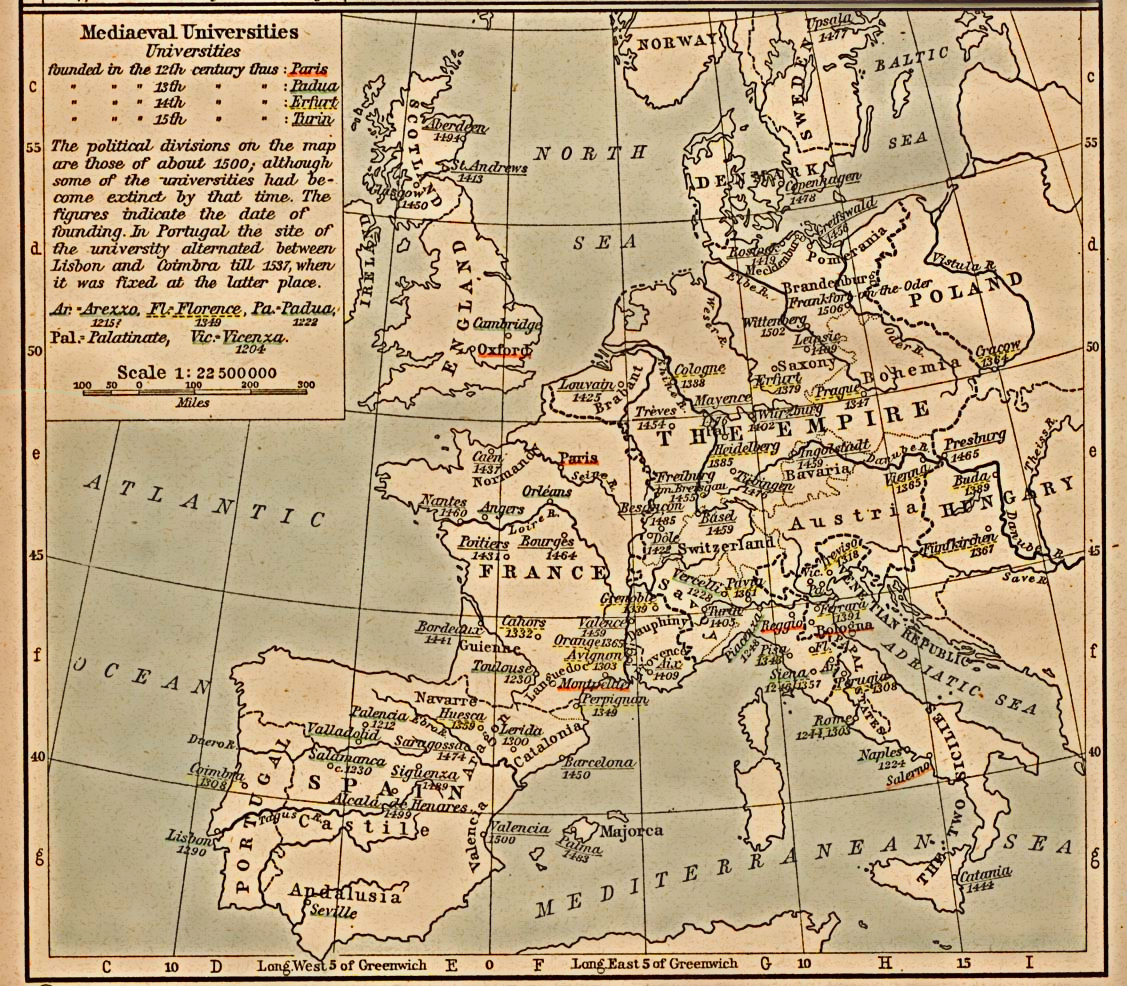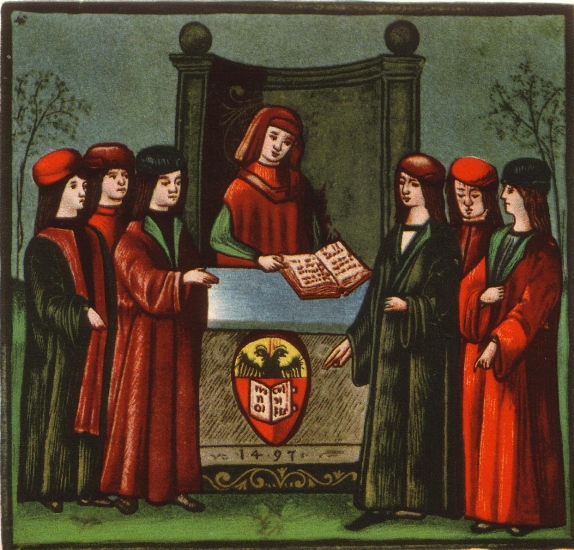|
University Of Vicenza
The University of Vicenza was a medieval university located in the town of Vicenza in the Veneto region of Italy. It was recognized as a studium generale in 1204. The university was first formed by students migrating from the University of Bologna; Hastings Rashdall suggests a number of universities were formed the same way during the first decade of the 13th century. The university closed in 1209. Pederson, Olaf,"The First Universities: Studium Generale and the Origins of University Education in Europe,"Cambridge university Press, 1997, page 161. See also * List of medieval universitiesReferences External links *https://web.arc ...[...More Info...] [...Related Items...] OR: [Wikipedia] [Google] [Baidu] |
University
A university () is an institution of higher (or tertiary) education and research which awards academic degrees in several academic disciplines. Universities typically offer both undergraduate and postgraduate programs. In the United States, the designation is reserved for colleges that have a graduate school. The word ''university'' is derived from the Latin ''universitas magistrorum et scholarium'', which roughly means "community of teachers and scholars". The first universities were created in Europe by Catholic Church monks. The University of Bologna (''Università di Bologna''), founded in 1088, is the first university in the sense of: *Being a high degree-awarding institute. *Having independence from the ecclesiastic schools, although conducted by both clergy and non-clergy. *Using the word ''universitas'' (which was coined at its foundation). *Issuing secular and non-secular degrees: grammar, rhetoric, logic, theology, canon law, notarial law.Hunt Janin: "The university ... [...More Info...] [...Related Items...] OR: [Wikipedia] [Google] [Baidu] |
Vicenza
Vicenza ( , ; ) is a city in northeastern Italy. It is in the Veneto region at the northern base of the ''Monte Berico'', where it straddles the Bacchiglione River. Vicenza is approximately west of Venice and east of Milan. Vicenza is a thriving and cosmopolitan city, with a rich history and culture, and many museums, art galleries, piazzas, villas, churches and elegant Renaissance '' palazzi''. With the Palladian Villas of the Veneto in the surrounding area, and his renowned ''Teatro Olimpico'' (Olympic Theater), the "city of Palladio" has been listed as a UNESCO World Heritage Site since 1994. In December 2008, Vicenza had an estimated population of 115,927 and a metropolitan area of 270,000. Vicenza is the third-largest Italian industrial centre as measured by the value of its exports, and is one of the country's wealthiest cities, in large part due to its textile and steel industries, which employ tens of thousands. Additionally, about one fifth of the country's gold a ... [...More Info...] [...Related Items...] OR: [Wikipedia] [Google] [Baidu] |
Veneto
Veneto (, ; vec, Vèneto ) or Venetia is one of the 20 regions of Italy. Its population is about five million, ranking fourth in Italy. The region's capital is Venice while the biggest city is Verona. Veneto was part of the Roman Empire until the 5th century AD. Later, after a Feudalism, feudal period, it was part of the Republic of Venice until 1797. Venice ruled for centuries over one of the largest and richest maritime republics and trade empires in the world. After the Napoleonic Wars and the Congress of Vienna, the Republic was combined with Lombardy and annexed to the Austrian Empire as the Kingdom of Lombardy–Venetia, until that was Italian unification, merged with the Kingdom of Italy in 1866, as a result of the Third Italian War of Independence. Besides Italian language, Italian, most inhabitants also speak Venetian language, Venetian. Since 1971, the Statute of Veneto has referred to the region's citizens as "the Venetian people". Article 1 defines Veneto as an " ... [...More Info...] [...Related Items...] OR: [Wikipedia] [Google] [Baidu] |
Italy
Italy ( it, Italia ), officially the Italian Republic, ) or the Republic of Italy, is a country in Southern Europe. It is located in the middle of the Mediterranean Sea, and its territory largely coincides with the homonymous geographical region. Italy is also considered part of Western Europe, and shares land borders with France, Switzerland, Austria, Slovenia and the enclaved microstates of Vatican City and San Marino. It has a territorial exclave in Switzerland, Campione. Italy covers an area of , with a population of over 60 million. It is the third-most populous member state of the European Union, the sixth-most populous country in Europe, and the tenth-largest country in the continent by land area. Italy's capital and largest city is Rome. Italy was the native place of many civilizations such as the Italic peoples and the Etruscans, while due to its central geographic location in Southern Europe and the Mediterranean, the country has also historically been home ... [...More Info...] [...Related Items...] OR: [Wikipedia] [Google] [Baidu] |
Studium Generale
is the old customary name for a medieval university in medieval Europe. Overview There is no official definition for the term . The term ' first appeared at the beginning of the 13th century out of customary usage, and meant a place where students from everywhere were welcomed, not merely those of the local district or region. In the 13th century, the term gradually acquired a more precise (but still unofficial) meaning as a place that (1) received students from all places, (2) taught the arts and had at least one of the higher faculties (that is, theology, law or medicine) and (3) that a significant part of the teaching was done by those with a master's degree. A fourth criterion slowly appeared: a master who had taught and was registered in the Guild of Masters of a ' was entitled to teach in any other without further examination. That privilege, known as , was, by custom, reserved only to the masters of the three oldest universities: Salerno, Bologna and Paris. Their reput ... [...More Info...] [...Related Items...] OR: [Wikipedia] [Google] [Baidu] |
University Of Bologna
The University of Bologna ( it, Alma Mater Studiorum – Università di Bologna, UNIBO) is a public research university in Bologna, Italy. Founded in 1088 by an organised guild of students (''studiorum''), it is the oldest university in continuous operation in the world, and the first degree-awarding institution of higher learning. At its foundation, the word ''universitas'' was first coined.Hunt Janin: "The university in medieval life, 1179–1499", McFarland, 2008, , p. 55f.de Ridder-Symoens, Hilde''A History of the University in Europe: Volume 1, Universities in the Middle Ages'' Cambridge University Press, 1992, , pp. 47–55 With over 90,000 students, it is the second largest university in Italy after La Sapienza in Rome. It was the first place of study to use the term ''universitas'' for the corporations of students and masters, which came to define the institution (especially its law school) located in Bologna. The university's emblem carries the motto, ''Alma Mater Studio ... [...More Info...] [...Related Items...] OR: [Wikipedia] [Google] [Baidu] |
Hastings Rashdall
Hastings Rashdall (24 June 1858 – 9 February 1924) was an English philosopher, theologian, historian, and Anglican priest. He expounded a theory known as ideal utilitarianism, and he was a major historian of the universities of the Middle Ages. Biography Born in Kensington, London, on 24 June 1858, Rashdall was the son of an Anglican priest. He was educated at Harrow and received a scholarship for New College, Oxford. After short tenures at St David's University College and University College, Durham, Rashdall was made a Fellow of first Hertford College, Oxford, then New College, Oxford, and dedicates his main work, ''The Theory of Good and Evil'' (1907), to the memory of his teachers T. H. Green and Henry Sidgwick. The dedication is appropriate, for the particular version of utilitarianism put forward by Rashdall owes elements to both Green and Sidgwick. Whereas he holds that the concepts of good and value are logically prior to that of right, he gives right a more ... [...More Info...] [...Related Items...] OR: [Wikipedia] [Google] [Baidu] |
Cambridge University Press
Cambridge University Press is the university press of the University of Cambridge. Granted letters patent by Henry VIII of England, King Henry VIII in 1534, it is the oldest university press A university press is an academic publishing house specializing in monographs and scholarly journals. Most are nonprofit organizations and an integral component of a large research university. They publish work that has been reviewed by schola ... in the world. It is also the King's Printer. Cambridge University Press is a department of the University of Cambridge and is both an academic and educational publisher. It became part of Cambridge University Press & Assessment, following a merger with Cambridge Assessment in 2021. With a global sales presence, publishing hubs, and offices in more than 40 Country, countries, it publishes over 50,000 titles by authors from over 100 countries. Its publishing includes more than 380 academic journals, monographs, reference works, school and uni ... [...More Info...] [...Related Items...] OR: [Wikipedia] [Google] [Baidu] |
List Of Medieval Universities
The list of medieval universities comprises universities (more precisely, '' studia generalia'') which existed in Europe during the Middle Ages.Rüegg 1992, pp. XIX–XX It also includes short-lived foundations and European educational institutions whose university status is a matter of debate. The degree-awarding university with its corporate organization and relative autonomy is a product of medieval Christian Europe. Before 1500, more than eighty universities were established in Western and Central Europe. During the subsequent Colonization of the Americas the university was introduced to the New World, marking the beginning of its worldwide spread as the center of higher learning everywhere (see List of oldest universities). Definition There were many institutions of learning (''studia'') in the Middle Ages in Latin Europe—cathedral schools, "schools of rhetoric" (law faculties), etc. Historians generally restrict the term "medieval university" to refer to an ins ... [...More Info...] [...Related Items...] OR: [Wikipedia] [Google] [Baidu] |
Universities And Colleges In Veneto
A university () is an institution of higher (or tertiary) education and research which awards academic degrees in several academic disciplines. ''University'' is derived from the Latin phrase ''universitas magistrorum et scholarium'', which roughly means "community of teachers and scholars". Universities typically offer both undergraduate and postgraduate programs. The first universities in Europe were established by Catholic Church monks. The University of Bologna (), Italy, which was founded in 1088, is the first university in the sense of: *being a high degree-awarding institute. *using the word ''universitas'' (which was coined at its foundation). *having independence from the ecclesiastic schools and issuing secular as well as non-secular degrees (with teaching conducted by both clergy and non-clergy): grammar, rhetoric, logic, theology, canon law, notarial law.Hunt Janin: "The university in medieval life, 1179–1499", McFarland, 2008, , p. 55f.de Ridder-Symoens ... [...More Info...] [...Related Items...] OR: [Wikipedia] [Google] [Baidu] |
_-_facade_on_Piazza_dei_signori.jpg)




